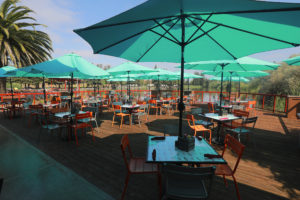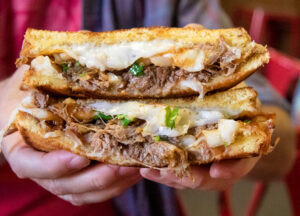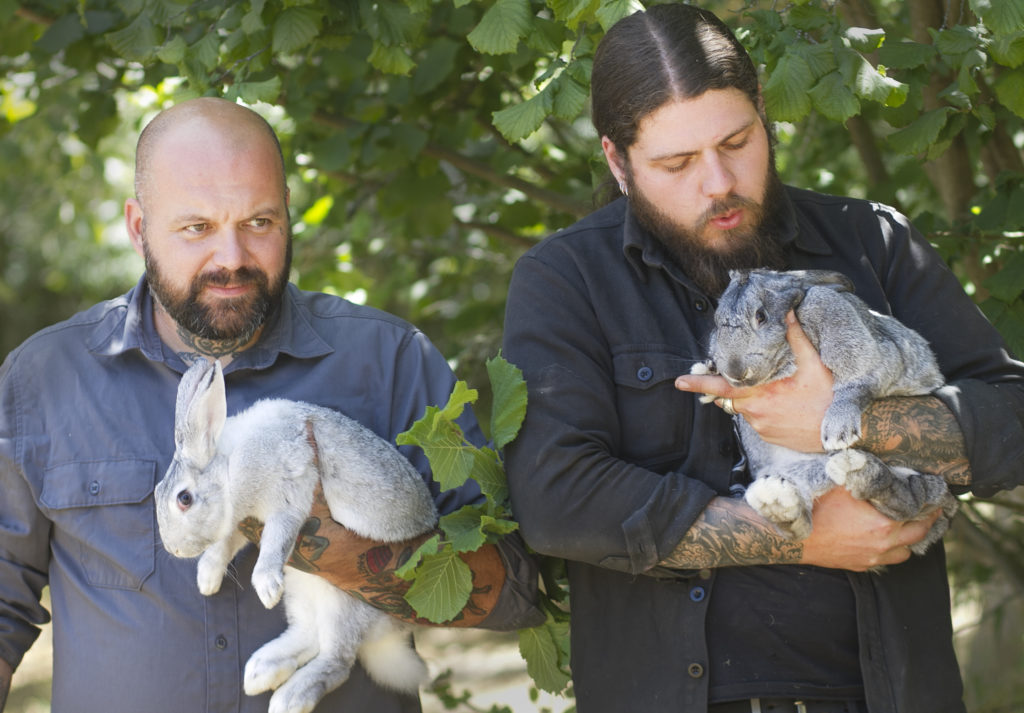
On a quiet, overgrown Sebastopol farm once owned by R&B legend Johnny Otis, Eric Shevchenko walks through a small rabbit enclosure with about 40 mostly female breeder rabbits. Resting or chewing on tufts of fresh grasses poking out of their feeding troughs, noses wiggle up and down, but otherwise, the Giant Chinchilla crosses are entirely non-plussed.
And while Shevchenko gives a scratch or a pat here and there as he walks past, he’s clear about his purpose: The rabbits he raises are for eating.
The owner of Old World Rabbitry, Shevchenko is one of just a handful of breeders in the Bay Area focused entirely on rabbit meat Mark Pasternak’s Devil’s Gulch Ranch is one of the largest). Dedicated to heritage rabbit breeds, humane handling and sustainable practices, Shevchenko’s micro-operation has gained the rapt attention of some of the Bay Area’s top toques, including Dominique Crenn of San Francisco’s Michelin-starred Atelier Crenn, Yountville’s French Laundry and St. Helena’s Meadowood.
“We have a large clientele for rabbits,” said Shevchenko, “and we actually can’t keep up with demand right now.” Which is good, because the burly, heavily tattooed 41-year-old, whose resume includes feeding carnivorous zoo animals and training dogs for the Iditarod, isn’t the kind of guy you’d see behind a desk.
He’d clearly rather be raising rabbits.

Hailed by chefs and foodies as one of the biggest food trends for 2015, rabbit (along with fermented foods, ramen and foraging) is being called the “new” other white meat (referring to pork and chicken), with a taste and texture somewhere between the two.
Calling it the “meat of the future” in a recent magazine article, Bel Campo Meat Co. President Bronwen Hanna-Korpi has joined a handful of local chefs from Sonoma County in embracing rabbit, including the Farmhouse Inn (7871 River Road, Forestville, (707-887-3300), Backyard (6566 Front St, Forestville, (707-820-8445) and Spinster Sisters (401 S A St, Santa Rosa, 707-528-7100). All have featured rabbit on their menus for years, served braised, roasted or as confit.
Mental barrier
But for many diners, there’s still a mental barrier. Though the game animal was a table staple for centuries, as beef consumption jumped in the 1960s rabbits were all but forgotten, according to the Agricultural Marketing Resource Center. And there was squeamishness about eating domesticated rabbits, often seen as pets or as childhood friends like Bugs Bunny and the Easter Bunny.
That’s starting to change.

Low in saturated fat and highly sustainable, rabbit meat is coming back to the table as the environmental costs of larger meat animals are becoming more evident, according to Shevchenko.
Ideal for small-scale farms this traditional game fodder breed quickly, require only a fraction of the water and feed (they can be raised without grain), and breed like, well, rabbits.
Most of the animals are harvested at just 8-10 weeks (primarily males), he said, can be processed on-site (unlike large animals), and have no religious restrictions on their consumption.
Hand feeding
“They grow really fast,” said veterinary tech and farmhand Simon Masiewicki, who nestles a kit (baby rabbit) in his paw-like hands. He gently blows on the animal’s head to calm it. Hand-feeding the rabbits with fists filled with grass, he’s clearly invested in the animals.
Based on what Shevchenko describes as “Raised Right” principles, Old World Rabbitry animals are bred in a low-stress environment with on-site vet care and a few scratches behind the ear.
“We want to change the (existing food) system from the ground up,” said Shevchenko.
“When I started farming as I child, it was to follow traditional animal farming to be respectful and have humane practices that people could admire for its ethics, while also perfecting genetics and taste.
“More than just that, I wanted to blend the best of modern nutritional science with old world techniques, combining elements that had never been combined before now,” he said.
Grow own feed
Though the five-acre farm that Shevchenko and Masiewicki are rehabbing is still mostly covered with weeds and crumbling outbuildings (including a former studio used by Otis) remnants of an orchard remain, and a newly constructed greenhouse incubates hydroponically sprouted barley grass to feed the rabbits.
The farm currently grows 80 percent of the feed using recycled water, and along with yucca, garlic and oregano, the rabbits are primarily fed a wild diet rather than commercial pellets.
Good food means better meat and helps with fertility, according to Shevchenko. Meaning even more rabbits.
“I got into rabbits as a healthier meat,” said Shevchenko. To stay healthy, “We have to do things that are very particular, and spend a couple extra dollars raising the animals,” he said.
After all, top restaurants won’t pay a premium (up to $9 per pound) for poorly-handled meat.
“What we do is a boutique product,” said Masiewicki.
“We are creating something sustainable because we want people to feel good about their food.”
Having grown up in a traditional Ukrainian family in Michigan, Shevchenko credits his grandfather with passing down the “Old Ways” of tending a farm and how to cook traditional Eastern European dishes that include game meats like rabbit.

© 2015 Galdones Photography/COCHON 555.
”My grandfather taught me a lot,” he said, “but now so many of those traditions are gone.”
“In the Old World, you raised your animals from birth, gave them names and nurtured them, kept them healthy.” says a statement on the Old World Rabbitry website.
“You looked them in the eye and treated them with respect by feeding them foods that you planted and allowing them to eat natural forage, giving them fresh air and open fields to roam. You did all of this knowing that one day they would give their lives so you could sustain your own, and those of your family and neighbors.
“It was called the ‘circle of life’ so you fed your animals the most balanced-by-nature foods. The ‘Raised Right’ projects that we are learning and teaching about will be the best way to understand the meats that we could offer.
Sold at the moment mostly to high-end restaurants, rabbit hasn’t returned to its common roots — yet.
Shevchenko sells to local butcheries including Thistle Meats (160 Petaluma Blvd N, Petaluma, 707-772-5442) and online at oldworldrabbitry.net.
He hopes to see his rabbits become more widely available in the future.
“You are supporting a revolution,” said Shevchenko. A rabbit revolution.
Want to support Old World Rabbitry’s Barnraiser? Rewards include a private dinner with Dominique Crenn, a dinner at the farm, rabbit meat or a dinner at The Lazy Bear in SF. Click here for details.











